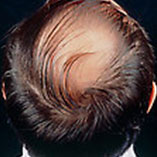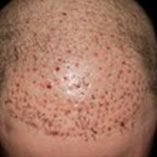Genetic Hair Loss
Androgenetic alopecia or hereditary pattern baldness is a form of hair loss typically experienced by men and is caused by hereditary factors under the influence of male hormone dihydrotestosterone (DHT) and aging. Under the influence of this factors the hair follicles become progressively smaller and eventually disappear - this process is called "miniaturization."
The hair follicles from the front, top, and crown of the scalp are sensitive to DHT and are more prone to sheding under it's influence, giving the speciffic hair loss pattern. This pattern is defined in the Norwood Classification: it begins with recession of the hairline at the temples and thinning of the crown, progressing to almost total baldness, except the back and sides of the scalp. The hair in these areas can be harvested and transplanted to bald or thinning areas and continue to grow as they would on the side and back of the head - see Hair Transplant Surgery.
Genetic Hair Loss
Hereditary thinning (androgenetic alopecia or female pattern hair loss) is the most common cause of women’s hair loss. The tendency to develop it can be inherited from either side of the family and do not necessarily leads to complete balding, but the thinning of the hair; it starts in the teens, twenties or thirties.
Female hair loss usually presents in a diffuse pattern, over the entire scalp. Sometimes thinning can be seen in a patterned distribution where it occurs mostly on the front and top of the scalp. The type of hair loss, diffuse or patterned, it's important to be diagnosed properly because it will impact over the type of treatment: medically (for women with diffuse hair loss), or by hair transplant surgery (for women with patterned hair loss).
Localized Hair Loss
Some dermatologic conditions can cause localized hair loss. The resulted hair loss pattern is usually quite different from the diffuse one of genetic hair loss and the diagnosis can be put by an experienced dermatologist, sometime after some tests, such as a scalp biopsy.
A tipe of localised balding is Alopecia Areata - a genetic, auto-immune disease manifesting as hair falling out and leaving round coin sized smooth patches on the head. Can be treated with the help of a dermatologist and it responds quite well to local injections of cortico-steroids.
Some other causes for localised hair loss are: constant pulling on scalp hair, through braiding, tight clips or hair systems (Traction alopecia); some medical or dermatologic conditions (Discoid Lupus, Lichen Planus, infections), thermal burns or local radiation therapy and face-lift surgery.
Medical Conditions
Systemic medical issues often cause a diffuse form of hair loss pattern that can be mistaken with genetic balding (especially at women), it is very important that undiagnosed alopecia be correctly evaluated by a dermatologist or a physician specializing in hair loss.
Some medical causes of women hair loss:- - Eating disorders (such as anorexia, bulimia)
- - Ovarian tumors
- - Anemia (iron deficiency), protein/calorie deficiency, essential fatty acid or zinc deficiency, malabsorbtion, and hypervitaminosis A
- - Thyroid disease
- - Lupus
- - Stress from surgical procedures, post-partum and post-menopausal states, severe emotional problems
- - Severe infection, flu or a high fever can be a cause of women’s hair loss.
Exterior causes
Medication or chemicals have the potential to interrupt the proper cycle of hair forming, for example: prescription drugs used for arthritis, depression, gout, blood thinning, heart problems or high blood pressure. Nutritional factors affect the hair directly including crash diets, zinc and iron deficiency, malabsorbtion, pancreatic disease, hypervitaminosis A, vitamin D deficiency, fatty acid and protein deficienty, severe caloric restriction. Oral contraceptive agents, especially those high in progestins.
Also, improper hair cosmetic use is another common cause of women’s hair loss: bleaches, hair dyes, straighteners, tints or perms. Overuse can cause the hair to become weak, brittle and leads to hair loss.
Ask more!
Ask a medical representative a question about hair transplant:
Latest news
-

Transplant procedures can be somewhat painful mainly due to local anesthesia using injections into the scalp. But new procedures do not involve needles
-

Hair transplantation can be performed at any age, technicaly, but probably in many cases doctors recommend patients to wait up to an age close to 30 years.
-

-

Depending on the method used for harvesting grafts, recovery time can vary from a few days (FUE method) to 1-2 weeks (FUT or STRIP method)
-

Very important rules for a healty transition after hair transplant surgery.
-

What technique? FUE or STRIP? Advantages and disadvantages of each.
Latest forum posts
-


In the forums section you can receive informed answers (including from a medical representative) about hairtransplant issues, products or services of interest to you. Just ask!

